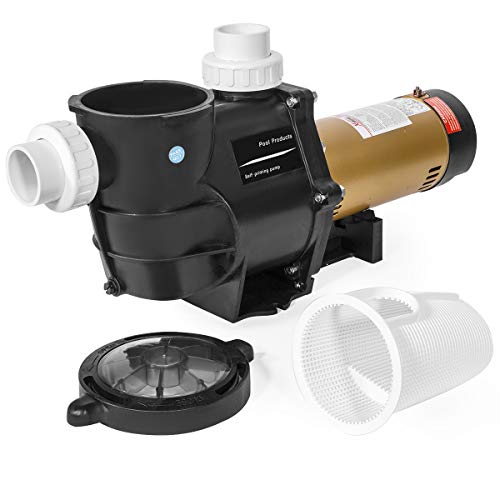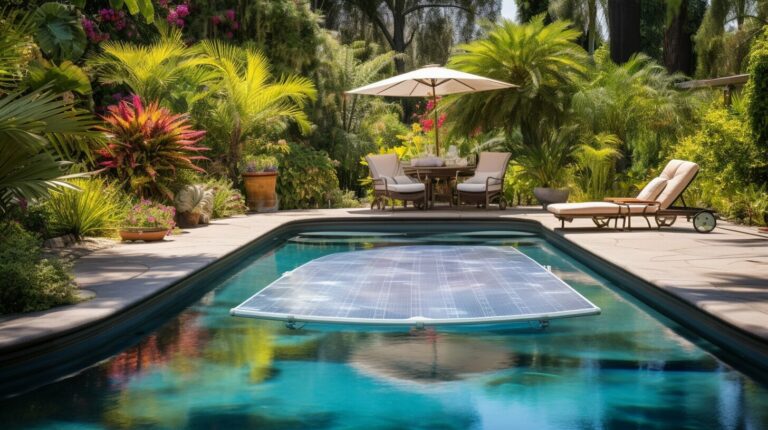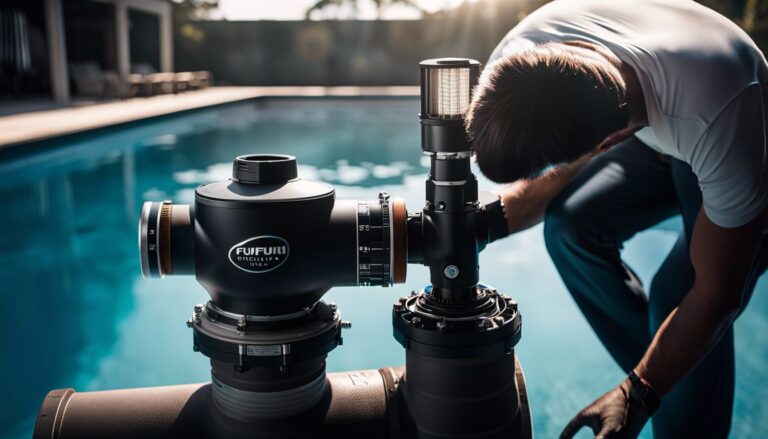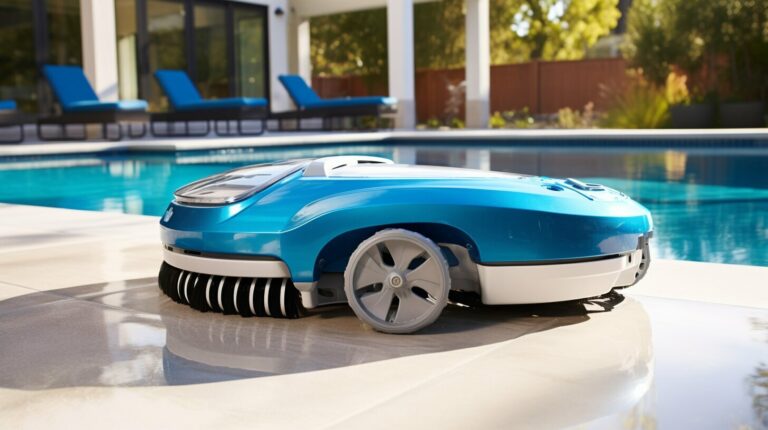How Long Does Pool Pump Motor Last? 2023 Replacement Guide
How Long Does Pool Pump Motor Last
How long does a pool pump motor last? It’s an essential piece of equipment, with most motors lasting, on average, around 10 years. This informative guide will shed light on everything you need to know about maintaining and maximizing the life expectancy of your pool pump motor.
Let’s dive into understanding how long a pool pump motor truly lasts!
Key Takeaways
- The average lifespan of a pool pump motor is typically 8 to 12 years, but proper maintenance and regular repairs can extend its longevity.
- Signs that indicate the need for repair or replacement include strange noises, constant leaks, frequent breakdowns, repeated shutdowns, loss of suction, power issues, and an aging pump.
- Factors such as water chemistry and regular maintenance habits can greatly impact the lifespan of a pool pump motor. Proper pH balance and chemical maintenance are important to prevent damage to the motor. Regular checks on bearings, capacitors, strainer baskets, o-rings/gaskets, and other components are vital for extending the motor’s life.
- Investing in a high-quality pool pump with a strong motor is crucial for optimal performance. A weak or outdated motor can lead to poor filtration and reduced flow rate. Proper maintenance and using good quality equipment will help extend the lifespan of your pool’s pump motor.
How Long Does Pool Pump Motor Last? The Lifespan of Pool Pumps
The average lifespan of a pool pump motor is typically 8 to 12 years.
The average lifespan of 8 to 12 years
 Your pool pump motor is like the heart of your swimming pool, relentlessly working behind the scenes to keep everything running smoothly. On average, you can expect a well-maintained, high-quality one to last between 8 and 12 years.
Your pool pump motor is like the heart of your swimming pool, relentlessly working behind the scenes to keep everything running smoothly. On average, you can expect a well-maintained, high-quality one to last between 8 and 12 years.
Like any mechanical device, it’s subject to wear and tear over time due to constant use. Proper care and regular maintenance are crucial in extending its lifespan as much as possible.
Certain factors, such as water chemistry and usage patterns, may affect this timeframe. However, don’t fret if things go south earlier than expected – timely repairs can often fix issues without needing a full replacement.
Replacement Pool Pumps
Signs indicating the need for repair or replacement
 Regular maintenance and keen observation can help you spot signs that your pool pump motor may need repair or replacement. Here’s a list of some common indicators:
Regular maintenance and keen observation can help you spot signs that your pool pump motor may need repair or replacement. Here’s a list of some common indicators:
- Strange noises: Unusual sounds from your pool pump motor could be a telltale sign that something is wrong. You might hear grinding, humming, or screeching.
- Constant leaks: If your pool pump persistently leaks water, it could mean a part is broken or worn out, demanding repair or replacement.
- Frequent breakdowns: Despite regular repairs, replacing the whole thing may be more cost-effective if your pool pump keeps breaking down.
- Pump shutting off repeatedly: A pump that often shuts itself off can indicate an overheating motor and might require a professional check or immediate replacement.
- Loss of suction: When the filtration system seems less effective than before, it might indicate an issue with the pool pump motor.
- Power issues: Trouble with the electric motors turning on or staying on are serious indicators requiring attention to your pool equipment.
- Aging pump: Pool pumps generally last 8-10 years; once they hit this mark, they typically start experiencing mechanical problems and signal a need for replacement.
Factors affecting lifespan (water chemistry, maintenance)
 Several influential factors can affect the lifespan of your pool pump motor. A crucial one is the chemistry of your pool water. Proper pH and chemical balance aren’t just vital for clean and healthy water and play a part in keeping mechanical devices like pump motors in good condition.
Several influential factors can affect the lifespan of your pool pump motor. A crucial one is the chemistry of your pool water. Proper pH and chemical balance aren’t just vital for clean and healthy water and play a part in keeping mechanical devices like pump motors in good condition.
Corrosive or imbalanced chemicals can eat away at certain pump parts, including o-rings, gaskets, and seals leading to shorter service life.
Maintenance habits are another major component determining how long your pool motor will last. Regular maintenance such as checking bearings and capacitors for any wear or damage, cleaning the strainer basket regularly, and ensuring lids are well fastened – these all contribute towards extending the lifespan of your pump motor.
Ignoring these could lead to unnecessary stress on the motor causing it to fail prematurely. Bottom line – consistent attention to water chemistry and regular maintenance can help ensure an optimal working pool pump for a long time.
Key Components of Pool Pump Motors
 The key components of pool pump motors include bearings, capacitors, pump housing, pump lid, strainer basket, O-rings and gaskets, seal plate, diffuser, and impeller.
The key components of pool pump motors include bearings, capacitors, pump housing, pump lid, strainer basket, O-rings and gaskets, seal plate, diffuser, and impeller.
Bearings
 The bearings in your pool pump motor play a crucial role in its functionality and overall lifespan. These small mechanical devices help reduce friction and allow the motor shaft to spin smoothly.
The bearings in your pool pump motor play a crucial role in its functionality and overall lifespan. These small mechanical devices help reduce friction and allow the motor shaft to spin smoothly.
Over time, wear and tear can cause the bearings to become noisy or seize completely. If you hear strange noises from your pump or notice decreased performance, it may be a sign that the bearings need attention.
Regular maintenance, such as lubricating the bearings, can extend their lifespan and keep your pump running efficiently for years.
Capacitors
 Capacitors are an important component of pool pump motors and play a crucial role in their operation. These small electronic devices store electrical energy and boost power to start the motor.
Capacitors are an important component of pool pump motors and play a crucial role in their operation. These small electronic devices store electrical energy and boost power to start the motor.
Over time, capacitors can wear out or become faulty, leading to problems with your pool pump. The start capacitor typically lasts around 5,000 starts, equivalent to 10 to 15 years of use.
On the other hand, run capacitors tend to have a longer service life than start capacitors. If you notice your pool pump not starting or experiencing strange noises, it could be a sign that the capacitors need attention.
Pump housing
 The pump housing is a key component of your pool pump motor. The protective casing houses all the important parts, such as the bearings, capacitors, and impeller.
The pump housing is a key component of your pool pump motor. The protective casing houses all the important parts, such as the bearings, capacitors, and impeller.
The quality of the pump housing can greatly impact the lifespan of your pool pump motor. A high-quality pump housing will help protect these internal components from damage caused by water exposure or debris.
It’s important to regularly inspect and maintain your pump housing to ensure it remains in good condition and prolongs the life of your pool pump motor.

Pump lid
The pump lid is a crucial component of your pool’s filtration system. It helps create a tight seal, preventing air leaks and ensuring proper suction. The lid gasket or lid O-ring on the strainer lid is critical in maintaining this seal.
However, frequent opening and closing of the strainer lid can lead to debris buildup on the gasket or O-ring. This debris can cause leaks or hinder the effectiveness of your pump. Regularly cleaning and inspecting the pump lid for any signs of wear or damage is essential to keep your pool’s filtration system running smoothly and efficiently.
Strainer basket
 The strainer basket is an essential component of your pool pump motor, responsible for filtering out large water debris before reaching the motor’s more sensitive parts.
The strainer basket is an essential component of your pool pump motor, responsible for filtering out large water debris before reaching the motor’s more sensitive parts.
It collects dirt and debris that enters your pool, preventing them from causing damage or clogging up the system. To keep your strainer basket working effectively, remember to empty it every two weeks or more frequently if there’s a lot of dirt and debris in your pool.
By regularly maintaining this key component, you can help prolong the lifespan of your pool pump motor and ensure optimal performance for years to come.
O-rings and gaskets
 O-rings and gaskets may seem like small components, but they play a critical role in the lifespan of your pool pump motor. These parts prevent air from entering where it shouldn’t and keep water in its proper place.
O-rings and gaskets may seem like small components, but they play a critical role in the lifespan of your pool pump motor. These parts prevent air from entering where it shouldn’t and keep water in its proper place.
If these seals become faulty or worn out, they can leak and damage your pool pump motor. To ensure the longevity of your pool pump motor, it’s important to check and maintain these o-rings and gaskets regularly and replace them when necessary.
By keeping these small but essential parts in good condition, you can extend the life of your pool pump motor and avoid costly repairs or replacements down the line.
Seal plate
 The seal plate is a crucial component of your pool pump motor, preventing water from entering the motor. By sealing in the shaft, it helps protect the motor from damage caused by water infiltration.
The seal plate is a crucial component of your pool pump motor, preventing water from entering the motor. By sealing in the shaft, it helps protect the motor from damage caused by water infiltration.
This small but important part can significantly extend the lifespan of your pool pump motor and keep it running smoothly for years to come.
Diffuser
 The diffuser is a crucial component of your pool pump motor. Located within the outer casing or attached, the diffuser works alongside other internal parts like the impeller and seals to regulate and direct the water flow in your pump.
The diffuser is a crucial component of your pool pump motor. Located within the outer casing or attached, the diffuser works alongside other internal parts like the impeller and seals to regulate and direct the water flow in your pump.
It plays a critical role in ensuring efficient circulation throughout your pool. If you hear unusual noises like screeching or humming coming from your pump, it may be a sign that the diffuser or other motor components need replacement.
Regularly checking for wear or damage on the diffuser and its counterparts can help prevent system failure and structural damage down the line. By properly maintaining and promptly replacing worn-out parts, you can extend the lifespan of your pool pump motor.
Impeller
 The impeller is a crucial component of your pool pump motor. It plays a critical role in circulating and maintaining good water quality. Over time, however, the impeller can become corrupted due to oxidation of metal components or debris buildup.
The impeller is a crucial component of your pool pump motor. It plays a critical role in circulating and maintaining good water quality. Over time, however, the impeller can become corrupted due to oxidation of metal components or debris buildup.
This corrosion can lead to a reduced flow rate and less efficient circulation. Regular maintenance and cleaning of the impeller can help prevent this issue and extend the lifespan of your pool pump motor.
Motor Lifespan
 The average lifespan of a pool pump motor is around eight years. However, it plays a critical role in the performance of your pool’s filtration system, so it’s important to ensure you have a strong motor for optimal functionality.
The average lifespan of a pool pump motor is around eight years. However, it plays a critical role in the performance of your pool’s filtration system, so it’s important to ensure you have a strong motor for optimal functionality.
Want to know more about the factors that affect the lifespan of pool pump motors? Keep reading!
The average lifespan of 8 years
The average lifespan of a pool pump motor is around eight years. This means that pool owners usually need to consider replacing their pumps after about eight years of regular use.
The motor is the most important part of the pump, as it plays a critical role in its performance and efficiency. So, if your pool pump motor starts showing signs of wear or isn’t working properly after eight years, it’s probably time to consider getting a new one.
Regular maintenance and taking care of your pool equipment can help extend the motor’s life and ensure your pool stays in good condition for a long time.
Importance of a strong motor for pump performance
A strong motor is crucial for the performance of your pool pump. Without a powerful motor, your pump will struggle to circulate and filter the water in your pool effectively. The motor is the heart of your pool’s circulation system, working with the impeller to keep your water clean and clear.
A weak or outdated motor can lead to poor filtration, reduced flow rate, and inefficient operation. Investing in a high-quality pool pump with a strong motor ensures that your pool stays properly maintained and avoids potential issues down the line.
Regular maintenance and using good quality equipment can also help extend the lifespan of your pump’s motor, saving you money in the long run.
When to Repair or Replace
 If your pool pump shows signs of wear and tear or is not performing as well as it used to, it may be time to consider repairing or replacing it. But how do you know which option is best for you? Read on to find out more!
If your pool pump shows signs of wear and tear or is not performing as well as it used to, it may be time to consider repairing or replacing it. But how do you know which option is best for you? Read on to find out more!
Factors to consider when deciding whether to repair or replace
- The age of the pool pump motor: If your motor is less than five years old, it’s generally more cost-effective to repair rather than replace it.
- Cost of repair: Compare the cost of repairs with the price of a new pump. If the repair cost is less than 70% of the replacement cost, repairing is usually the better option.
- Frequency of repairs: If you are experiencing frequent breakdowns or repairs, investing in a new pool pump motor may be more beneficial in the long run.
- Energy efficiency: Older pool pumps are less energy-efficient than newer models. Consider how much you could save on energy costs by upgrading to a more efficient pump.
- Warranty coverage: Check if your pool pump motor is still under warranty. Replacing a faulty motor under warranty may be a more cost-effective option.
- Lifespan and condition of other components: Assess the overall condition of your pool equipment. If other components are nearing their lifespan or showing signs of wear, replacing the entire system may be more practical than just the motor.
- Long-term plans: Consider your long-term plans for your pool. If you have used it for many years, investing in a new high-quality pump may be worth it.
- Environmental factors: Depending on where you live, environmental factors such as climate and water quality can affect the lifespan and performance of pool pumps. Take these factors into consideration when making your decision.
Remember, deciding whether to repair or replace your pool pump motor depends on various factors. It’s important to weigh these factors carefully before deciding what fits your needs and budget best.
Types of Pool Pumps
 There are different types of pool pumps, such as magnetic drive pool motors used in newer variable speed pumps.
There are different types of pool pumps, such as magnetic drive pool motors used in newer variable speed pumps.
Magnetic drive pool motors (used in newer variable speed pumps)
One type of motor commonly used in newer variable-speed pool pumps is the magnetic drive pool motor. These motors are designed with magnets that spin the rotor, resulting in increased efficiency and energy savings.
Manufacturers claim these motors have a longer lifespan than other pump types, making them a reliable choice for pool owners looking to upgrade their equipment.
With their advanced technology, magnetic drive pool motors contribute to improved pump longevity and can help save on energy costs in the long run.
The lifespan of 6 to 8 years for magnetic drive motors
Magnetic drive motors, commonly used in newer variable speed pool pumps, typically have a lifespan of 6 to 8 years. These motors are designed for energy efficiency and operate at different speeds to help save on energy costs.
With regular maintenance and proper care, you can ensure that your magnetic drive motor lasts its full lifespan and keeps your pool water flowing smoothly.
Conclusion
 In conclusion, the lifespan of a pool pump motor typically ranges from 8 to 12 years. However, water chemistry and regular maintenance can affect its longevity. It is important for pool owners to be aware of signs indicating the need for repair or replacement and to consider upgrading to newer, more energy-efficient pumps for long-term savings.
In conclusion, the lifespan of a pool pump motor typically ranges from 8 to 12 years. However, water chemistry and regular maintenance can affect its longevity. It is important for pool owners to be aware of signs indicating the need for repair or replacement and to consider upgrading to newer, more energy-efficient pumps for long-term savings.
When necessary, properly maintaining and replacing pool pump motors ensures optimal performance and enjoyment of your swimming pool.
FAQs
- What is the average lifespan of a pool pump motor? Under ideal conditions and with diligent upkeep, Pool pump motors are typically expected to last anywhere from 8 to 12 years.
- How do the different types of pool pumps, such as single-speed and variable-speed pumps, compare in longevity? The durability of single-speed and variable-speed pool pumps can be quite similar, potentially reaching the 8-12 year mark with proper care. However, due to their ability to operate at lower, more efficient speeds, variable-speed pumps may experience less wear and tear, potentially leading to a longer lifespan.
- What factors may impact the lifespan of my pool pump motor? Various factors influence the life expectancy of your pool pump motor. These include usage frequency, maintaining proper water chemistry, the quality of the pump’s installation, and exposure to harsh weather. The type of pump (single-speed, dual-speed, or variable-speed) and how often it’s run can also affect its longevity.
- What are some telltale signs that my pool pump motor might be nearing its end? Notable indicators your pool pump motor might be reaching its end include persistent breakdowns, excessive noise, or decreased water circulation effectiveness despite regular maintenance and repairs. A spike in energy bills could also suggest an aging pump is becoming less efficient.
- How can I prolong the lifespan of my pool pump motor? Regular maintenance is critical for extending the life of your pool pump motor. This includes ensuring the motor and surroundings are clean, checking leaks, listening for unusual sounds, and maintaining optimal water chemistry levels. For variable-speed pumps, utilizing slower speeds can also reduce wear and tear.
- When is the best time to consider replacing my pool pump motor? When your pool pump motor constantly malfunctions, makes excessive noise, or fails to circulate water despite proper maintenance effectively, it might be time to consider a replacement. Also, if your energy bills are rising due to the pump’s declining efficiency, a new, energy-efficient model could be a cost-effective solution.
- What benefits can I expect from replacing my old single-speed pump with a new variable-speed pool pump? Replacing an old single-speed pump with a variable-speed model can lead to significant energy savings, quieter operation, and extended equipment life. Variable-speed pumps can adjust to your pool’s exact needs, running at slower speeds for everyday circulation and higher speeds for tasks like running water features or rapid turnover, optimizing energy usage.
- What costs are associated with replacing a pool pump motor? In addition to the new motor or pump cost, you should also factor in labor costs and any necessary replacement parts, such as a shaft seal. The total cost can vary greatly depending on whether you’re simply replacing the motor or opting for a complete pump replacement. Obtaining a few quotes from local providers is a good idea to ensure a fair price.









